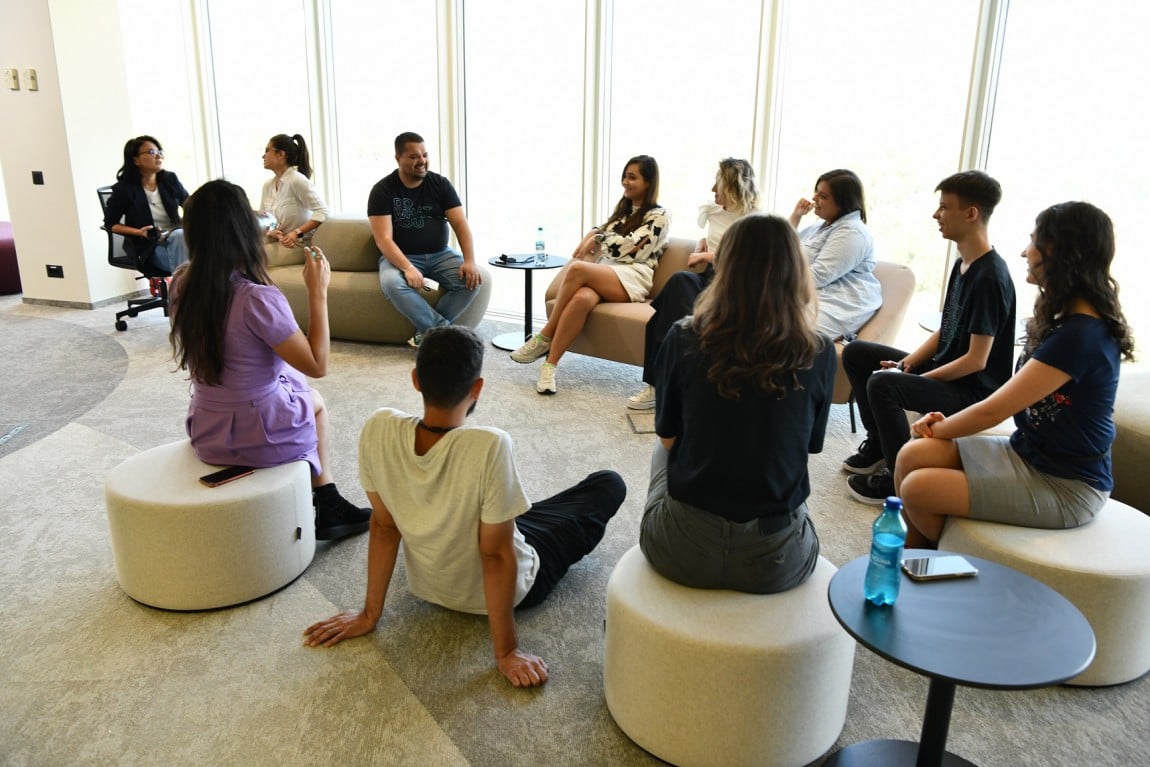Several years ago, at a conference where I was scheduled to speak, I was asked to cover for a participant who couldn’t attend. After some discussion, we agreed to talk about mentorship. It took me an hour to prepare, though over 8 years of my mentoring experience was summarized into a simple “Dos and Don’ts” list. I recently revisited these notes and am excited to share them with you.
My name is Viktor Gerasymov, Delivery Director at SoftServe. I hope these insights will help you succeed as a mentor or even as a mentee.
BUT LET'S START WITH SOME BASIC THOUGHTS ABOUT MENTORSHIP
Mentorship is a unique collaboration between mentor and mentee. It bridges mentee’s unique knowledge, experience, and expectations with the mentor's unique knowledge and expertise. So, the key to effective mentoring is exactly that a mentor should have the expertise that the mentee seeks to develop. And it thrives on voluntary relationships; when both parties are genuinely motivated and engaged, the results are far more impactful.
Also, from my experience, setting clear goals, having a plan, facilitating the mentee’s growth, and having regular checkpoints are essential to a successful mentorship, as well as empathy as it helps to build strong, supportive relationships.
NOW, LET’S EXPLORE MY TOP 10 DOS FOR SUCCESSFUL MENTORSHIP
1. Learn the expectations first.
This helps define the endpoint, where (or who) your mentee wants to be at the end of the process—point B. Having these clearly articulated at the beginning will help you define the desired goals and find the right mentor to cover them — the one with the proper experience and, importantly, who will be motivated to spend time covering those particular areas.
For example, I may refuse to be a mentor if asked to cover basic requests on a given subject. For that, you might read a book or an article or take some courses available all over the Internet. And I’ll be happy to extend obtained knowledge with those nuances you cannot get anywhere but from real-life experience, things that will take years to master, things that actually make the difference between good and great.
2. Analyze the gaps.
Once learned the expectations, a mentor should interview the mentee to learn more about their current experience. This will help understand how big the gaps are between “now” and “where they want to be”, to see which areas will require more time to cover, and will help to estimate the total efforts required from the mentor. This is the starting point — point A.
3. Create a plan.
Once you are clear on the start and end points, it is time to develop a plan for moving from A to B. List the topics to cover, preferably prioritized, milestones, and checkpoints. And you’d better have it written down. Too often, I have seen situations where having no plan led to distraction, resulting in a lot of time and effort spent on secondary tasks by both mentor and mentee that didn’t really bring them closer to point B.
4. Employ a facilitative (not advise) approach.
One of the goals for a mentee is to learn to perform specific tasks, e.g,, analyzing inputs, developing solutions, and implementing them. Therefore, mentees should learn how to perform those activities by themselves. If a mentor tells the mentee what to do, it doesn’t allow the mentee to gain their own experience. B By developing their expertise, mentees can achieve situational flexibility — the ability to quickly react to changes making the best possible decisions — which is crucial in the fast-changing environment in which we live now. I would also not advise any manager or team leader to practice the approach of telling their subordinates what to do and how, but rather to stimulate them to develop an active position of analyzing and making decisions (this is a topic for a separate discussion, though).
5. Listen and ask; ask, don’t tell.
Ask your mentees to explain their decisions and their thinking process. Ask why they decided to do this and not that. What was the reasoning? What was the decision-making process? Which information was used? When you ask questions, you help your mentee to take a broader view of a situation, find proper or just more dependencies between things, see which conclusions were made correctly and which are doubtful, etc. Or it could be that your mentee can defend their decision by arguing it properly. Do not make assumptions upfront; please talk to your mentee about that.
6. Challenge your mentee.
I believe that personal development (whether it is in sports or professional growth) comes with little overachievements — situations when you do something you haven’t done before: run a little faster or longer, lift a little more weight, fight a slightly stronger opponent, or solve a task you have never done yet. In other words, if you continue doing what you already know how to do, you just stay at the same level. So, as a mentor, I recommend challenging your mentee with each task: adding more complexity, scale, participants, or conditions, embracing thinking more strategically or for a longer perspective, etc. With such an approach, you will not only help your mentee to develop new skills but also will show that they should not be afraid of something unknown because, with a proper approach, any issue might be solved.
7. Maintain regular contact.
Regular contact is important to maintain the pace of learning, much like having regular classes in school. You have them regularly to learn something new, practice, rehearse, and apply knowledge. When you do not practice something for some time, you start forgetting it (if you need more information on this, please go and learn about the forgetting curve). A good thing you can do as a mentor to help your mentee remember more is to start every new meeting with a short repetition of the items discussed in the previous one. It also could be helpful to discuss a situation where corresponding knowledge was applied and what the result was.
8. Show support.
It is normal for your mentee to not succeed at everything at once. There might be failures and setbacks. It is very important for the mentor, though, to show support in such situations, encourage the mentee to move forward, help analyze those failures, collect lessons learned, and keep moving forward. Some think that failures even help to learn faster since nobody really likes to be in trouble. And most likely, next time, you will be more proactive in doing everything to avoid getting in trouble.
9. Celebrate wins.
Let’s look at small wins as anything you achieve on the way to your goals. They are like milestones you reach and pass on your way to the desired goal. Achieving more and more wins shows progress, and being focused on progress helps to see where to put your efforts next to continue moving towards the goal. Small wins keep us moving forward and can help us avoid procrastination. Therefore, the power of celebrating small wins as one of the primary motivating factors cannot be overestimated. If you want your mentee to stay interested in learning, help them see their progress — help recognize those small achievements.
10. Practice empathy.
All people are different; they think differently, behave differently, and look differently. All of that can make it harder for us to understand each other. However, empathy allows us to bridge those differences and build higher-quality relationships between mentor and mentee. It helps to understand your mentee’s point of view, lets them feel safe, and thus be more accepting. It helps mentors provide better and more relevant support, especially when overcoming failures, and who knows, it might become the key success factor in your mentorship relationship.
While mentorship is rewarding, common pitfalls can hinder its effectiveness. Recognizing and addressing these can lead to more meaningful mentorship relationships.
SO, HERE ARE SOME OF THE MISTAKES YOU, AS A MENTOR, MUST TRY TO AVOID
1. Telling your mentee what to do and how to do it.
No two people are alike, and no two situations are identical. Therefore, even trying to act the same as you did in a slightly different situation might yield dramatically different outcomes without even understanding the causes. And it prevents the mentee from gaining their own experience.
2. Bad match.
A bad match might result in the mentor being unable to help due to a lack of particular experience that mentee is seeking to develop, or even lack of will.
3. Not setting goals.
This seems pretty straightforward: "Without goals and plans to reach them, you are like a ship that has set sail with no destination," – Fitzhugh Dodson.
4. Ignoring checkpoints.
Checkpoints are very important not only to verify if you are on track with your plan but also to ensure that the plan is still relevant or even if your goal is still relevant. And so, to make necessary changes to the overall mentorship process.
5. Lack of commitment.
Committing is like holding oneself accountable; hence, it means maintaining a personal interest in the best possible outcome. Not being committed might mean a person just doesn’t care about the result. Also, please think about it from a different angle: if you are not committed to success, maybe you are subconsciously okay with failure. Are you?
MENTORSHIP AT SOFTSERVE: A PROVEN TOOL FOR TALENT DEVELOPMENT
Mentorship has been a cornerstone of talent development at SoftServe for over 10 years. It’s a highly effective and valuable tool for both personal and career growth. As of August 2024, we have more than 800 active mentors, and on average, around 40 new mentor-mentee pairs are formed each month. This highlights the popularity and importance of mentorship as a learning instrument within our company.
To learn more about mentorship at SoftServe, check out our annual SoftServe University Report. You can also explore further insights in this article: Mentoring in the Workplace.
Remember, you can always be part of something bigger. Together, we can achieve remarkable things.
*Author: VIKTOR GERASYMOV | DELIVERY DIRECTOR AT SOFTSERVE



 Compare
Compare 

































